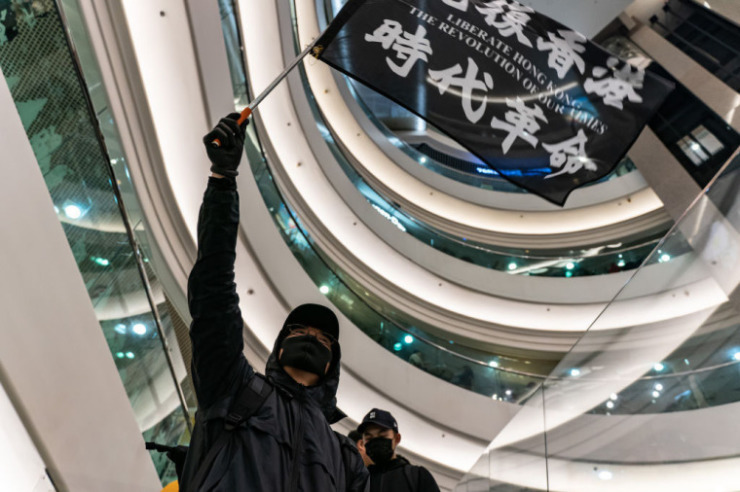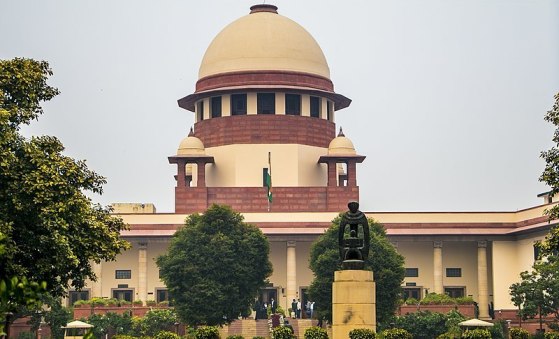
Hundreds of protesters stormed malls and other shopping areas in Hong Kong Thursday amid a third day of Christmas holiday demonstrations and confrontations with police.
According to the South China Morning Post, police used tear gas and pepper spray to disperse the hundreds of black-clad, masked protesters targeting malls over Christmas Eve, Christmas Day and Boxing Day, prompting many stores to close. The "shopping protests" led to the arrest of over 310 protesters calling for democratic freedom and police reforms in the city.
Violence escalated as demonstrators threw umbrellas and other objects at police who responded by beating some with batons. A 19-year-old protester was injured after jumping over a railing from the first floor to the ground level of the Yoho shopping center in Yuen Long.
Protesters chanted slogans including "Revive Hong Kong, revolution of our time" and "Hong Kong independence" as they occupied the shopping malls.
"Lots of people are shopping so it's a good opportunity to spread the message and tell people what we are fighting for," Ken, an 18-year-old student, told The Guardian. "We fight for freedom, we fight for our future."
The protests began nearly seven months ago in response to a now-withdrawn bill that would have allowed extraditions to mainland China. The proposed bill was precipitated by the murder of a pregnant teenager by her boyfriend during a vacation in Taiwan. Because the Hong Kong government does not have an extradition treaty with Taiwan, legislation was proposed that would have allowed the extradition of suspects from the city to other countries, including mainland China. The protests have since evolved into a broader pro-democracy movement amid widespread fear that Hong Kong's rule of law is being eroded.
Protesters are also calling for greater police accountability in Hong Kong, demanding an independent inquiry into the force's behavior. Thousands of people, including police officers, have been injured since the protests began in June.
Protests have been peaceful for much of December after pro-democracy candidates won district council elections the month before. However, Hong Kong's pro-Beijing leaders have made no concessions to the protesters, leading to increasingly confrontational rallies over the holiday season.
"I think the purpose for us to come out is to ... let people realize that so many front-line protesters sacrificed (things) for them. They should not forget and (simply) celebrate Christmas," a protester identified as Sandy told Reuters.
"We have been fighting for almost seven months now, and the Hong Kong police have done so many bad things."
The government on Thursday criticized "unprecedented violence" by some protesters, while Hong Kong leader Carrie Lam condemned demonstrators in a Facebook post, accusing demonstrators of "dampening" the festive mood.
"Many members of the public and tourists coming to Hong Kong were naturally disappointed that their Christmas Eve celebrations have been ruined by a group of reckless and selfish rioters," she said in a statement.
While the protests ended Thursday, demonstrators vowed to return to the streets in force for a mass rally on Jan. 1, 2020, to welcome the new year. The Financial Times reports that the Civil Human Rights Front has applied for approval for a protest on New Year's Day and demonstrators are "discussing plans for New Year's Eve."
Christians — who make up 11 percent of the population — have been actively engaged with the social movement. Many are driven by the fear that losing Hong Kong's autonomy and subjecting citizens to China's legal system will erode religious freedom, given China's human rights abuses against Uighur Muslims, Christians, Falun Gong, and other religious minorities.
The Rev. Patrick Mahoney of the Christian Defense Coalition, who earlier this year traveled to Hong Kong to join the protests, told The Christian Post: "[T]he persecution and the oppressive nature of the mainland Chinese government in 1997 is not what it is today. Under President Xi, churches have been bulldozed. Christians are being thrown into jail. Uighurs are being put in internment camps."
"When this 50 years ends and [Hong Kong] becomes part of mainland China, we know right now they will be persecuted," Mahoney added. "They will be brutalized, they won't be able to get a job, their churches will be monitored."
Courtesy of The Christian Post.




